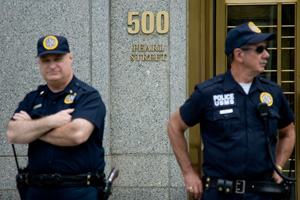Read Karen Greenberg’s previous coverage of the Ghailani trial here.
At 9 a.m. Thursday, there were three of us in the visitor’s gallery for the trial of Ahmed Ghailani, the first and could-be only trial in civilian courts of a Guantanamo detainee. The day’s narrative was focused on the purchase of the vehicle that delivered the explosives used in the 1998 bombing of the American embassy in Dar-es-Salaam, Tanzania. The jurors are attentive, leaning forward, taking notes. They seemed to be growing accustomed to their role here.
The tone for the day, however, was set by Judge Kaplan, who the previous night had released the (redacted) long version of his opinion barring the testimony of a government’s key witness, Hussein Abebe. In an opinion that reasoned backwards to Deuteronomy and forward, in theory, to any future Guantanamo cases where the prosecution might attempt to bring witnesses identified via the torture of the defendant, the judge asserted not just his expertise in legal philosophy and precedent, but confidence in his ability to assess the witness’s credibility. Throughout his opinion, he refers to the testimony of Abebe as “inaccurate,” “incredible,” “inconsistent,” and consisting of “prevarications.”
As if on cue, Thursday’s proceedings focused on credibility. Two FBI agents took up most of the morning session. Both were factual, calm, and methodical in relating their findings. Special Agent Gregory Carl testified to the forensic work he did in the days following the attack on Dar es Salaam. Heavy set, gray-haired and matter-of-fact, he told the jury that he had been an explosives expert in the investigations of the Pan Am 103 bombing in 1988; the first World Trade Center bombing in 1993; and the Oklahoma City bombing in 1995. He held up a five-foot piece of a steel from the alleged bomb-delivery vehicle. On the wreckage, the FBI had found the car’s VIN number, which was associated with a white Nissan truck the prosecution says was purchased by Ghailani.
In exquisite detail, with numerous documents and two Tanzanian witnesses (an importer and a car broker), the prosecution guided the jury through the history of the Nissan truck. It was a complicated trail that followed the vehicle from its purchase from Japan through a repo proceeding to the sale, allegedly, to two men named Ahmed, one tall and one not, the latter—allegedly Ghailani—nicknamed Foobie (Swahili for “short”).
Several times, the witnesses faltered over legalities and facts. The importer had originally registered the vehicle to his newborn daughter, Lulu. The broker, Sulyyum Juma, who allegedly arranged the sale of the truck to the two Ahmeds from a man named Sultan, seemed confused as to his memory of which of the Ahmeds he had made certain arrangements with. Bit by bit, a narrative took shape, complete with a cast of characters—Foopie and the tall guy; Lulu; Sultan—who will likely reemerge as the case wears on. A trial is always, in part, a kind of storytelling, and like many stories, this one had plenty of confusion and inconsistency. Eventually, the judge and jury will be asked to sort out the facts—but for now, they seem content simply to absorb them.















